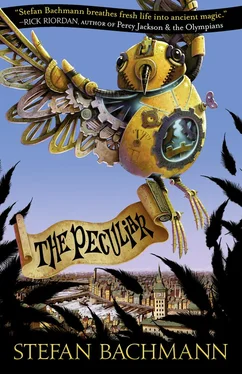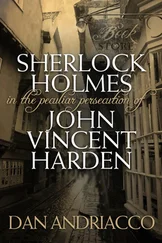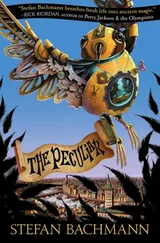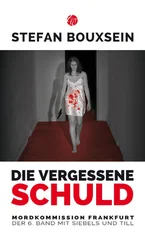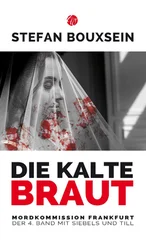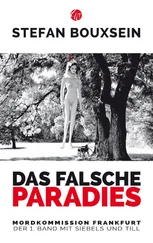She must have gone up and down Old Crow Alley six or seven times before coming to a halt in front of the house directly across the way from where Bartholomew and Hettie watched. It was an ancient, sharp-roofed house, with chimneys and doors that poked through the stone in odd places. Two larger houses stood on either side, pinching it in, and it was set a little farther back from the alley, behind a high stone wall. An archway was set into the wall in the middle. The twisted remains of a metal gate lay on the ground. The lady stepped over it and into the yard.
Bartholomew knew who lived in that house. A family of half-bloods, the mother a faery, the father a bellows worker at the cannon foundry on Leechcraft Street. The Buddelbinsters, he’d heard them called. Once they’d had seven changeling children, and Bartholomew had seen them playing in the windows and the doorways. But other people had seen them, too, and one night a crowd had come and dragged the children away. Now there was only one, a frail-looking boy with thistle-hair. Bartholomew and he were friends. At least Bartholomew liked to think they were. Some days, when Old Crow Alley was particularly quiet, the boy would steal out onto the cobbles and fight invisible highwaymen with a bit of stick. He would catch sight of Bartholomew staring at him from the window. The boy would wave. Bartholomew would wave back. It was utterly forbidden—waving at people through windows—but so wonderful to do that Bartholomew forgot sometimes.
The lady in the plum-colored dress stalked across the rubble-strewn yard and rapped on the door nearest to the ground. Nothing happened for what felt like an age. Then the door was yanked open to the end of its chain, and a thin, sour-looking woman poked her head through the gap. It was the father’s old-maid sister. She lived with the Buddelbinsters, minded their business for them. That included opening the doors when they were knocked on. Bartholomew watched her eyes grow round as saucers as she drank in the sight of the exquisite stranger. She opened her mouth to say something. Then she seemed to think better of it and slammed the door in the lady’s face.
The lady in the plum-colored dress stood very still for a moment, as if she didn’t quite understand what had happened. Then she knocked on the door again, so loudly it echoed out of the yard, all the way up Old Crow Alley. A few houses away, a curtain twitched.
Before Bartholomew and Hettie could see what would happen next, the stairs outside the door to the rooms they lived in began to creak noisily. Someone was hurrying up them. Next, a red-cheeked woman burst in, huffing and wiping her hands on her apron. She was small and badly dressed and would have been lovely with enough to eat, but there was never enough to eat, so she looked somewhat wilted and bothered. When she saw the two of them on the floor she clapped her hands to her mouth and shrieked.
“Children, get away from the window!” In three steps she had crossed the room and was dragging them up by their arms. “Bartholomew, her branches were sticking right up over the sill. Do you want to get seen?”
She shooed them to the back of the room and bolted the door to the passage. Then she spun on them. Her eyes fell on the potbellied stove. Ash flitted out through the slats in its door.
“Oh, would you look at that,” she said. “I asked you to empty it, Barthy. I asked you to watch out for your sister, and wind up the wash wringer. You’ve done nothing …”
In an instant Bartholomew had all but forgotten the lady in plum. “Mother, I’m sorry I forgot about Hettie’s branches, but I found something out, and I had a very good idea, and I need to explain it to you.”
“I don’t want to hear it,” his mother said wearily. “I want you to do as you’re told.”
“But that’s just it, I won’t have to!” He cleared his throat, drew himself up to his full height of three and a half feet, and said, “Mother, may I please, please, please summon a domesticated faery?”
“A what? What are you talking about, child? Who’s that in the Buddelbinsters’ yard?”
“A domesticated faery. It means it lives in houses. I want to invite a faery servant. I’ve read about it here and here, and here it explains how to do it.” Bartholomew lifted a heap of old books from behind the stove and pushed them up under his mother’s nose. “Please, Mother?”
“Larks and stage lights, would you look at that dress. Barthy, put those books down, I can’t see properly.”
“Mother, a faery! For houses!”
“Must be worth twenty pounds, and what does the silly goose do? Marches down here through all this muck. I do declare. Rusty cogs in that head and nothing but.”
“And if I get a good one, and I’m nice to it, it would do all sorts of work for us and help pump the water and—”
His mother wasn’t looking out the window anymore. Her eyes had gone stony-flat, and she was staring at Bartholomew.
“—wind up the wash wringer,” he finished weakly.
“And what if you get a bad one.” It wasn’t a question. Her voice drove up between his ribs like a shard of nasty iron. “I’ll tell you what, Bartholomew Kettle. I’ll tell you! If we’re lucky it’ll sour the milk, empty our cupboards, and run off with every shiny thing it can get its fingers on. Otherwise it’ll just throttle us in our sleep. No, child. No. Don’t you ever be inviting faeries through that door. They’re upstairs and downstairs and on the other side of the wall. They’re all around us for miles and miles, but not in here. Not again, do you understand me?”
She looked so old all of a sudden. Her hands shook against her apron and tears shone at the corners of her eyes. Hettie, solemn and silent like a little ghost, retreated to her cupboard bed and climbed in, closing the door with the most accusing look. Bartholomew stared at his mother. She stared back. Then he turned and slammed through the door into the passageway.
He heard her cry out after him, but he didn’t stop. Don’t get yourself noticed, don’t let them see. His bare feet were quiet on the floorboards as he fled up through the house, but he wished he could shout and stomp. He wanted a faery. More than anything else in the world.
He had already imagined exactly how it should happen. He would set up the invitation, and the next day there would be a petal-winged pisky clinging to the top of his bedpost. It would have a foolish grin on its face, and large ears, and it wouldn’t notice at all that Bartholomew was small and ugly and different from everyone else.
But no. Mother had to ruin everything.
At the top of the house they lived in together with various thieves and murderers and faeries was a large and complicated attic. It ran this way and that under the sagging eaves, and when Bartholomew was little it had been filled with broken furniture and all sorts of interesting and exciting rubbish. Everything interesting and exciting had deserted it now, the rubbish having all been used as kindling during the bitter winter months or swapped for trinkets from the traveling faery peddlers. Sometimes the women crept up to hang their washing so that it could dry without being stolen, but otherwise the attic was left to the devices of the dust and the thrushes.
And to Bartholomew. There was one part where, if he was very careful, he could squeeze through a gap between a beam and the rough stone of a chimney. Then, with much wriggling and twisting, he would arrive in a forgotten little gable. It did not belong to anyone. There was no door, and only a child could even stand up in it. It was his now.
He had fixed it up with odds and ends that he had salvaged—a straw mat, some dry branches and strands of ivy, and a collection of broken bottles that he had strung together in a pitiful copy of a Yuletide garland he had read about. But his favorite part of the attic was the small round window, like the sort in a boat, that looked out onto Old Crow Alley and a sea of roofs. He never tired of looking through it. He could watch the whole world from there, high up and hidden away.
Читать дальше
